Climate Governance in Egypt
Attachments

The CAT Climate Governance series seeks to produce a practical framework for assessing a government’s readiness - both from an institutional and governance point of view - to ratchet up climate policy and implement adequate transformational policies on the ground, to enable the required economy-wide transformation towards a zero emissions society.
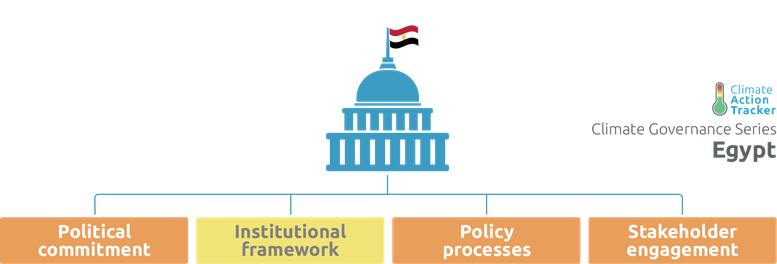
Our methodology
We have set up a framework that assesses and scores a number of indicators, where we rate various aspects of governance. This allows us to establish a common basis on which to compare climate governance across countries as well as identify areas of improvement and highlight positive developments. We have applied this framework at a national level only.
For more detail on our methodology, see here: methodology page.
Assessment of national level readiness
President El-Sisi has not been a strong advocate of the need to transition the Egyptian society and economy towards net zero emissions, though this may change as Egypt prepares to host the climate negotiations in November 2022. He has traditionally focused on the importance of climate adaptation and emphasised the need for climate finance from developed countries. More broadly, expanding the country’s natural gas production is a top priority for government officials, both for the country’s own energy security and as a valuable export commodity, not starting on the path to decarbonisation.
While the climate change lead agency is entrusted with clear legal mandates, it needs greater power to reinforce its position as the lead institution on climate change issues in Egypt.
There is incremental improvement in Egypt’s climate policy development, but the process is slow. And, there have been some notable rollbacks, including measures adopted in response to the fuel shortages the country experienced a decade ago, and more recent measures that may dampen the speed of renewable energy uptake.
The trustworthiness and the accountability of Egypt’s government is considered to be low both generally and in relation to environmental governance metrics, which may inhibit the transition. Constitutional addendums passed in 2019 mean that the President could stay in power until 2030. The extent to which there is broadscale political support for the transition to a zero emissions society is somewhat moot against such a backdrop.
The National Council for Climate Change (NCCC) is an inter-ministerial committee and the key-decision body responsible for coordinating climate policy development and implementation across ministries and agencies. Assessing its effectiveness is difficult as information on the workings of the Council is limited. Transition-related policy development also appears to be taking place in other settings, with the link to the NCCC unclear. Coordination with national and subnational governments is poor as there are no climate specific coordination mechanisms.
Mainstreaming the concept of a transition to a zero emissions society within government is in its infancy as Egypt has only recently begun to consider the need for such a transition. Egypt announced its 2050 National Climate Change Strategy (NCCS) in November 2021, though few details are available. Egypt’s numerous policies and strategy documents are generally aligned, though these are not transition focused and not updated frequently.
Egypt does not have an authoritative body with an explicit mandate to provide the government with transition-related advice, though some agencies may be capable of playing such a role. The government does consider external advice as part of its policy-development process.
While the country has a high level of climate finance readiness in some areas, the financial and technical resources of the Ministry of Environment need to be improved. Some specific technical capacities within the Ministry are lacking, such as GHG inventory preparation and funding proposals preparation, so it relies on external consultants. However, overall the Ministry is run by well-qualified staff who enable the lead agency, Egyptian Environmental Affairs Agency (EEAA), to build continuous institutional learning.
Egypt’s processes to develop, implement and track the policies needed to enable the transition are weak. The country has not adopted a net zero target, nor has it set out a pathway to achieve it. The 2050 National Climate Change Strategy is not publicly available.
The country’s existing legal architecture is comprised of piecemeal sectoral legislation which may help climate mitigation, but it lacks comprehensive, climate-focused legislation to support the transition. A legislative review is underway to include climate change in all relevant laws, though no timeline for its completion has been given. Implementation of existing regulations has also been problematic: enforcement of building sector energy use and efficient regulations are a case in point.
Egypt does not have a comprehensive transparency framework. A proposal was developed a few years ago, but it has not yet been adopted by the government. GHG inventories are an exception, with evidence of improvement at the national and sub-national level. Egypt has not established a formal review mechanism for transition-related policies, nor is there evidence of any domestic ratchet-up mechanism. The country did not submit an updated NDC during the period 2020/2021, although one is in the works.
Stakeholders are consulted as part of the decision-making process; however the scope and the depth of those consultations is difficult to gauge. Consultations take place against a backdrop of low levels of public understanding of climate change - only about 40% of Egyptians consider that they know at least a moderate amount about climate change. Civil society is active in the climate space, but often faces capacity limitations, and recent legislative reforms have curtailed the ability of these groups to function. Government efforts around creating awareness and public education have been ad hoc to date, but a number of initiatives are planned in the lead-up to its hosting COP27.
Egypt lacks a comprehensive strategy to ensure a Just Transition, but has had some success with the phasing out of its energy subsidies and the promotion of green jobs. The full phase-out of consumption subsidies has been pushed back to mid 2025, due, in part, to concerns of rising consumer prices.
The military is heavily involved in Egypt’s economy, especially in major public infrastructure projects, which likely lessens the effect non-state actors can have on the government compared to other countries. This involvement is in activities that both support and potentially hinder the transition.
As the incoming COP27 host, there is the potential for Egypt to improve on a number of governance metrics. The Egyptian Government is also talking a lot more about climate change. Whether that turns into action remains to be seen.
For a presentation of Egypt, see our MENA Climate Week 2022 webinar here.
Rating system
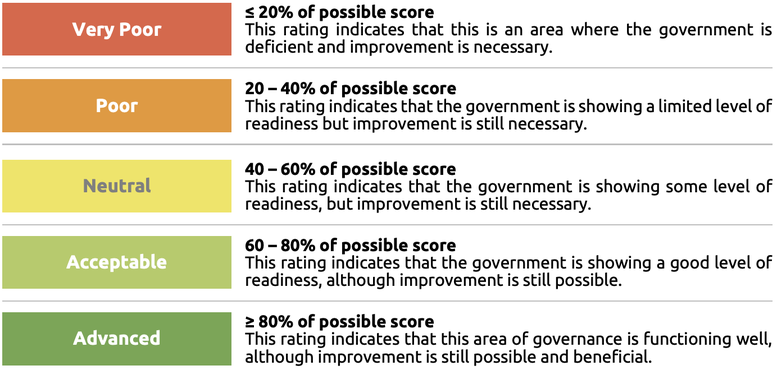
We analyse a number of different criteria of governance under four categories that cover the key enabling factors for effective climate action. We give each a rating as outlined above (very poor - poor - neutral - acceptable - advanced). For more detail on our methodology, click the link below.
Ratings and recommendations
The following section outlines the results of the analysis for each of the different categories and criteria as well as our recommendations for each category of governance.

- Ensure climate change is a priority for political leaders.
- Entrust the Egyptian Environmental Affairs Agency (EEAA) with greater power and functions to reinforce its position as the lead institution on climate change.
- Ensure that all relevant climate-concerned ministries have the mandate to lead on transition action.

- Improve NCCC to ensure that climate mitigation and the transition are mainstreamed into sectoral.
- Establish a climate-specific coordination mechanism between national for engaging with subnational governments.
- Allocate more financial resources to the Ministry of Environment and entrust the Egyptian Environmental Affairs Agency (EEAA) with sufficient technical human resources to enable both institutions to lead on climate action.
- Strengthen existing programmes to build capacity within the Ministry of Environment and reduce reliance on consultants.

- Submit an updated NDC, including a quantified emissions reduction target.
- Pass comprehensive climate-focused legislation and strengthen the implementation and enforcement of existing laws.
- Publish the 2050 Strategy and develop a long-term net-zero pathway, if not already covered by the Stategy.
- Ensure that all sectoral policies are aligned with the 2050 Strategy and regularly revise these policies in light of broader market developments.
- Establish a domestic transparency framework and climate change transparency focal points in all relevant ministries to better ensure GHG inventory data collection and tracking of mitigation actions.
- Develop a formal review mechanism to ensure effective monitoring and assessment of policy measures being implemented and a formal ratchet-up mechanism to ensure targets are strengthened over time.
- Make all major climate policy documents widely available (e.g., online).

- Use its role as in-coming COP President to raise the level of public awareness and education on climate change, and the need to cut GHG emissions.
- Improve existing stakeholders consultation mechanisms to ensure adequate public participation and buy-in.
- Develop a comprehensive strategy to ensure a Just Transition and promote green jobs, building on the success Egypt has had with phasing out energy subsidies.
- Remove restrictions on civil society groups and allow them to freely advocate for greater climate action.
Egypt's Climate Governance
These tables from the report give an overview and analysis of the key factors of Egypt's governance to enable effective climate action. We have looked at the country's key institutions, strategies, targets and legislation.
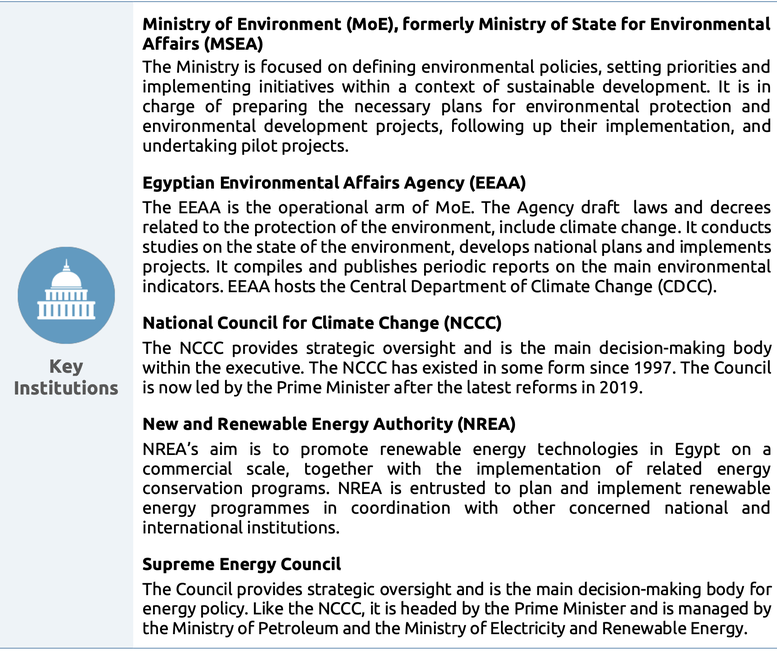
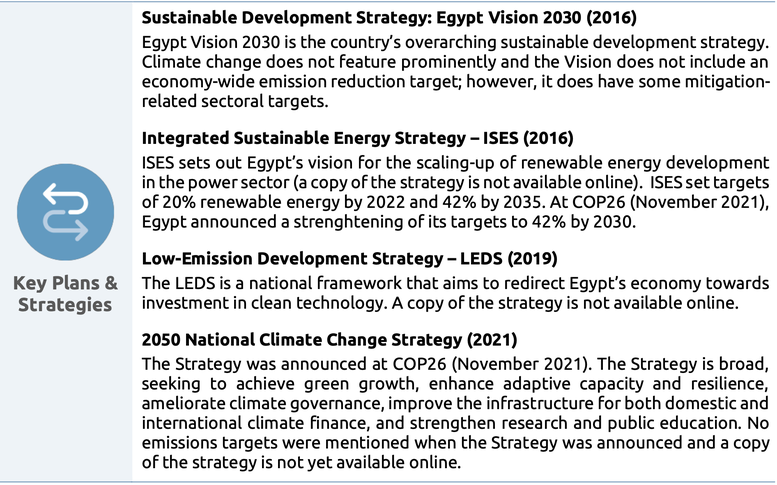
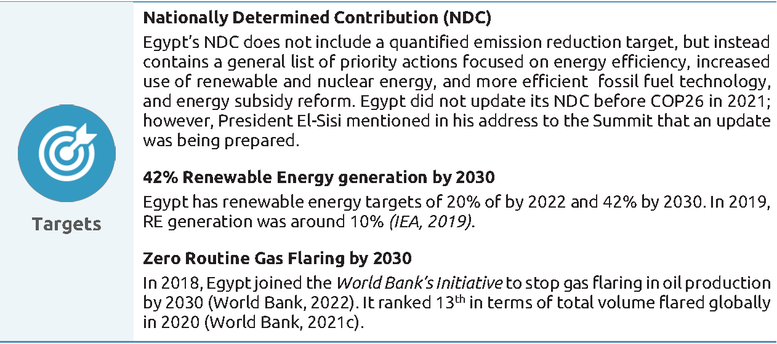
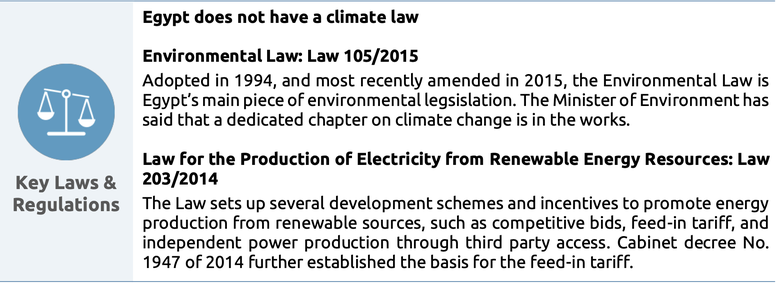
Stay informed
Subscribe to our newsletter